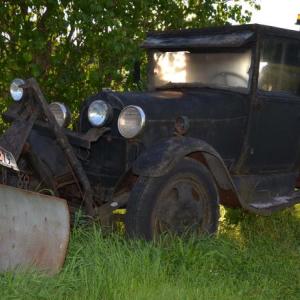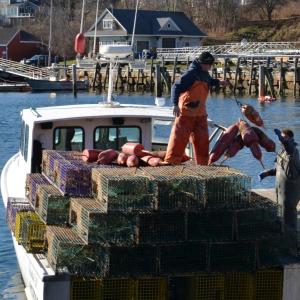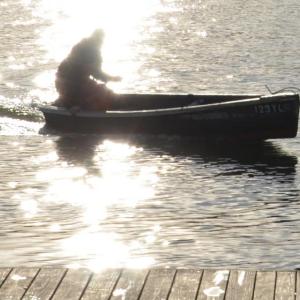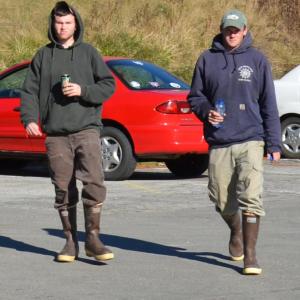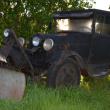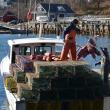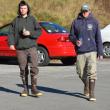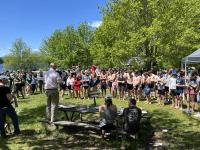What working guys do in the fall on the Midcoast
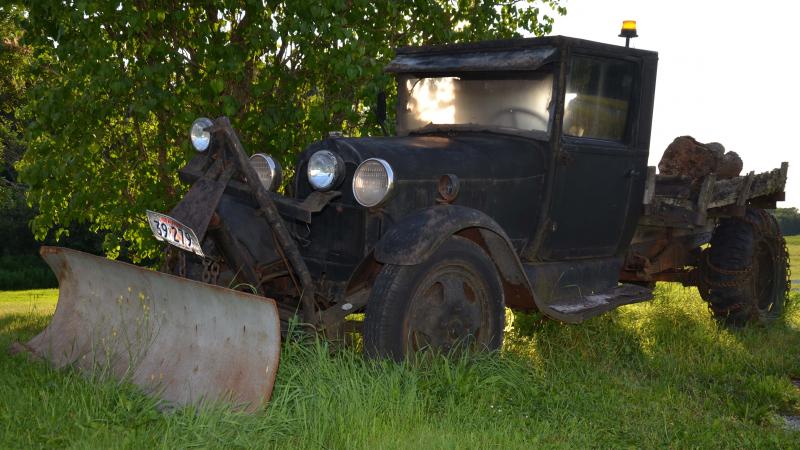 The plows get hooked to trucks in the fall, and the logs hauled in from the woods. This old truck lives in Warren. (Photo by Lynda Clancy)
The plows get hooked to trucks in the fall, and the logs hauled in from the woods. This old truck lives in Warren. (Photo by Lynda Clancy)
 Lobstermen haul their traps along about December. (Photo by Lynda Clancy)
Lobstermen haul their traps along about December. (Photo by Lynda Clancy)
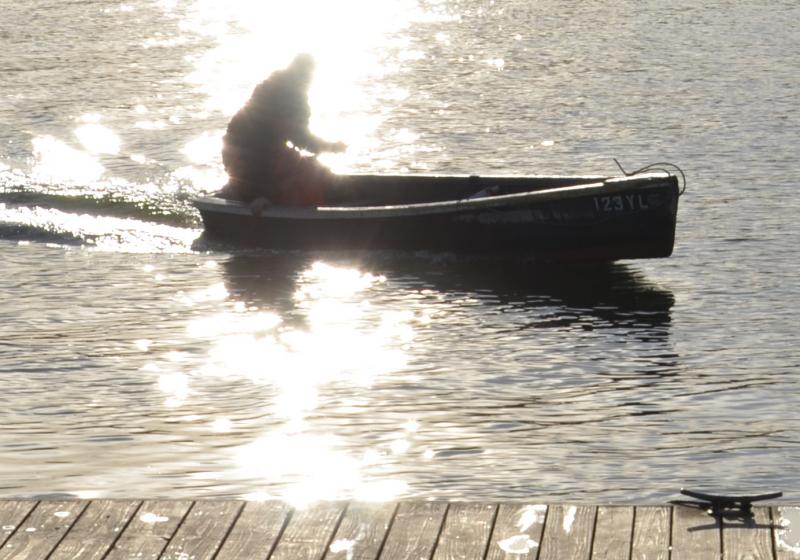 Skiffs ply the harbors until the ice skims the water. (Photo by Lynda Clancy)
Skiffs ply the harbors until the ice skims the water. (Photo by Lynda Clancy)
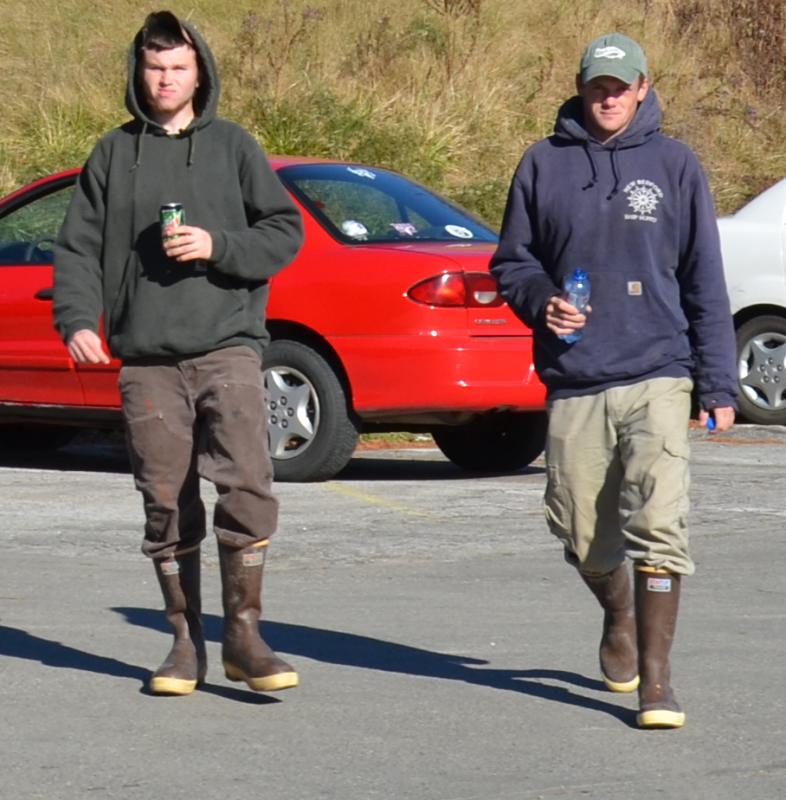 Sternmen get done for the season, then it’s off to other work — carpentry, plowing snow, or to points south and west where the weather is warmer and employers need hard-working Mainers. (Photo by Lynda Clancy)
Sternmen get done for the season, then it’s off to other work — carpentry, plowing snow, or to points south and west where the weather is warmer and employers need hard-working Mainers. (Photo by Lynda Clancy)
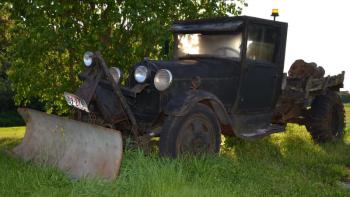 The plows get hooked to trucks in the fall, and the logs hauled in from the woods. This old truck lives in Warren. (Photo by Lynda Clancy)
The plows get hooked to trucks in the fall, and the logs hauled in from the woods. This old truck lives in Warren. (Photo by Lynda Clancy)
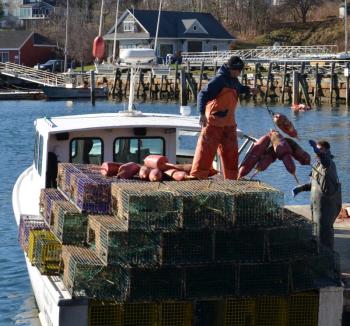 Lobstermen haul their traps along about December. (Photo by Lynda Clancy)
Lobstermen haul their traps along about December. (Photo by Lynda Clancy)
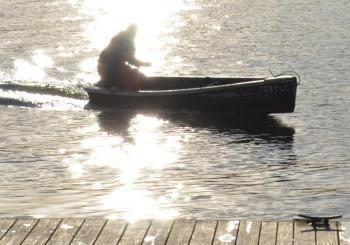 Skiffs ply the harbors until the ice skims the water. (Photo by Lynda Clancy)
Skiffs ply the harbors until the ice skims the water. (Photo by Lynda Clancy)
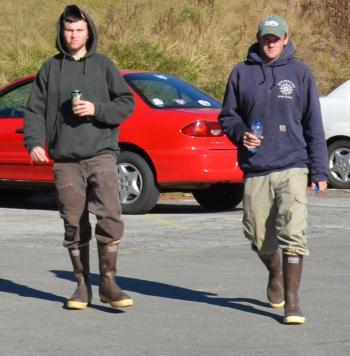 Sternmen get done for the season, then it’s off to other work — carpentry, plowing snow, or to points south and west where the weather is warmer and employers need hard-working Mainers. (Photo by Lynda Clancy)
Sternmen get done for the season, then it’s off to other work — carpentry, plowing snow, or to points south and west where the weather is warmer and employers need hard-working Mainers. (Photo by Lynda Clancy)
“Work is about a search for daily meaning as well as daily bread, for recognition as well as cash, for astonishment rather than torpor; in short, for a sort of life rather than a Monday through Friday sort of dying.” ― Studs Terkel
Fall is like another person coming in, said one young entrepreneur/artist/farmer. He is 22 and works on his family farm in Rockport.
Like many who choose to live at latitude 44N, he watches as autumn filters through the woods and into the gardens, accepting the coming cold as an elemental part of being. It is the rhythm in a region where weather shapes existence.
“I like it,” he said. “The cool, crisp air. I like breathing it. Fall is another presence.”
Maine’s character changes as autumn settles in, and we change accordingly. Maybe some new coveralls or a coat (Carhaart, Dickies) might get purchased at Reny’s, or a trip up to Brewer for a new pair of Redwing boots.
As the days shorten, the light recedes. That means much must done in a shorter span of time. Efficiency is the name of game. Rest will come later, after the holidays, when the wood stoves require a watchful eye, round-the-clock stoking gets under way and indoor projects beckon.
On the farms, the summer crops will have been tilled under. The bush hog stored away. Later, logs will be hauled across swamps, when the ground freezes. Canadian chains will be lashed over the tires. Tree poles will be propped vertically beneath the greenhouse ceilings, reinforcing roofs against the weight of the snow and ice that is sure to come.
And a bull will be slaughtered, meat to feed a family through the winter. They free-range through a few summers, feeding like kings on grass and hay.
“You want them to have a good time while they are on earth.”
***********
Autumn is about getting ready. The men who make a living mowing lawns and landscaping homes, summer estates and businesses will drain the gas from the motors.
“Run ‘em dry,” said one longtime landscaper.
That day comes, “as soon as the last leaf is picked up and before the first snowstorm. When the grass stops growing.”
And grass continues to grow through October, depending on the surges of warm air that move up from the Gulf Stream.
Why drain the gas?
“Because everybody says drain your gas because it’s going to dry out your gaskets.”
Something to do with ethanol in the gas, which eats away at the rubber.
**********
Then the plows come out, hitched to the front ends of Ford 250s, 350s, Chevys, Dodges and GMCs just before the first substantial snow, with predictions of 3 inches the bellwether.
Those blades need their maintenance. The guys who make money plowing (and it can be a serious income source) take their equipment to the dealership, perhaps over to Dave Herrick, who sells Fisher Plows. Fisher plows are made in Rockland at Fisher Engineering, and guys here tend to shop local.
“You’re flying the yellow,” they say.
The snowplow list — the Black Book — also requires attention. They keep it on the computer. But they don’t generally call customers to check in for the coming season. That’s too much talking. Assume that they will be there to plow, unless you see their death notice in the paper.
“Customers call you if they don’t want it.”
A lot of money can be made in a short amount of time plowing snow, if one’s act is together. Maybe $1,200 a snowstorm. Four storms in a month brings in more than cutting 40 lawns in 80 hours. Exhausting, except you sleep at night on a regular schedule when you mow lawns. In the winter, the weather dictates the plowing schedule, and sleeping beauties hear off in the snow distance the plow guys hard at work, their blades scraping, 1 a.m., 2 a.m., 3 a.m.
Still, the income....
“I make a boatload of money and work half as hard as I do mowing lawns.”
That’s assuming everything is going well and nothing breaks down.
Plowers keep a fair eye on their customers’ property through the winter, and many implement a sliding fee scale, especially for the elderly and single mothers, the ones who have to get out of the driveway first thing in the morning to get to daycare and then work. It’s how people look out for each other around here.
As for the carpenters and painters? They stay outside until they just can’t anymore. Then they move indoors.
The contractors don’t tend to work too hard on their yards.
“I never finalize my lawn,” says one construction company owner. “It’s a mowing adventure.”
But they keep hammering.
Maybe the day starts at 7 a.m. instead of 6:30 a.m., as the weather changes.
“You don’t get as much work done.”
Why not?
“Your hands are numb.”
******
Hands are numb on the water, too.
The recreational boats get hauled, beginning in September. The two-strokes get fogged and tucked away in the barn or garage.
Some fishermen won’t be hauling and storing their lobster traps until early December, if the weather is good. Then their boats will be trailered home to the yard, inboard engines flushed, traps stacked.
Some, however, will move traps further offshore, five or six miles out, to maintain the business through the winter. Off Port Clyde and Tenants Harbor, there are fishermen — it is said — who may reap up to $10,000 a day in a November lobster haul.
A few turn their eyes to the urchin season, which begins Dec. 2 in Zone 1 (Rockport is at the northern end of Zone 1, with the boundary line of Zone 2 bisecting Penobscot Bay).
That’s how guys make-do through the fall here. They work hard. They keep their chainsaws sharpened. They shift with the seasons. If they are smart, they are diligent in maintaining their tools, and they build trust with their customers. They work, and they set aside time for play — hunting, fishing, boating, building, exploring.
And they may likely be getting a beer just before dusk, stomping their feet at the bar doorstep, loosening mud, and later, the first snow, from their boots.
Event Date
Address
United States

